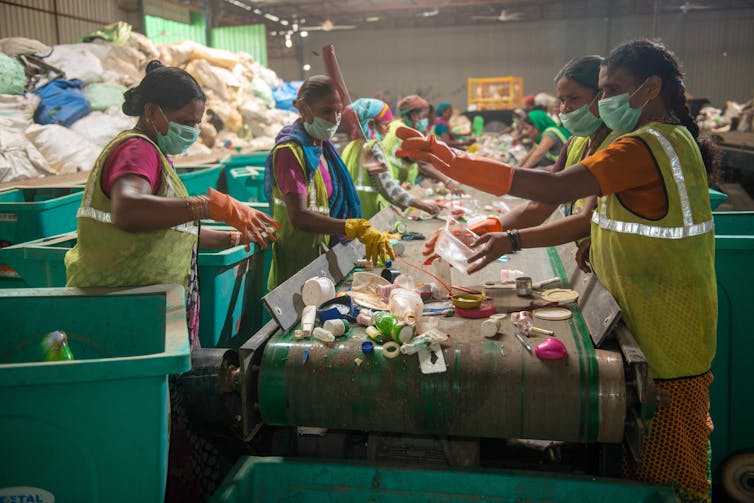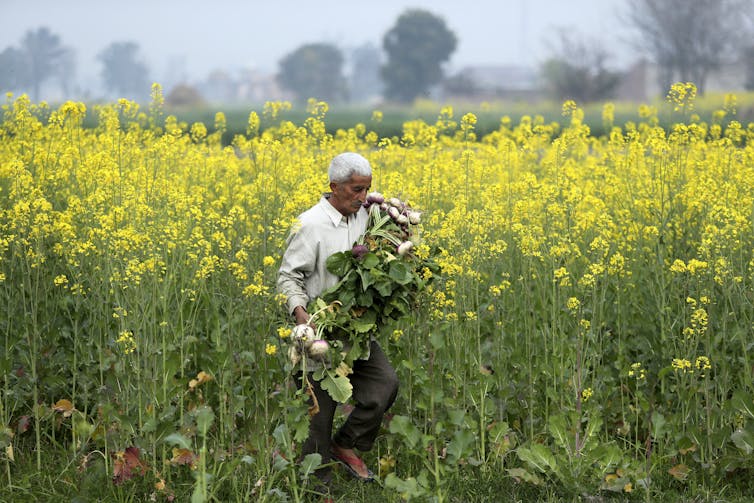Digital platforms such as Uber, Airbnb, WeChat and TaskRabbit have changed the world by creating new economic opportunities through gig work culture and enabling a sharing economy. However, concerns remain about how these platforms may exploit gig workers and customers if driven purely by profit.
While these platforms are great at creating value by bringing buyers, sellers and consumers together, their benefits often don’t transcend to their ecosystem. They have been criticized for their poor social and environmental impacts, exclusionary practices, digital colonialism and surveillance capabilities.
To leverage the power of platforms for social good, it’s important to design socially-oriented platforms within ecosystems of shared value that target the UN’s sustainable development goals.
To focus on sustainable development goals, platforms need to change from being exclusively focused on profits and value appropriation, to perceiving themselves as public goods that innovate responsibly by co-creating and sharing economic, social and environmental value.
While this is easier said than done, some organizations have begun the process.
A new non-profit
Commercial platforms are expected to earn an estimated $60 trillion by 2025. Meanwhile, the Platform Commons Foundation — an Indian non-profit that builds inclusive platforms to address global grand challenges — is focused on creating social value, while economic value is secondary.
The Platform Commons Foundation has launched a number of platforms focused on sustainable development goals such as poverty alleviation, providing quality education and decent work, improving economic growth and reducing inequalities.
One of the Platform Commons Foundation’s many platforms — I Got Garbage — transformed the lives of underpaid and marginalized waste management workers in India’s informal sector, who faced frequent harassment and exploitation, by helping them earn a steady income and a dignified livelihood.
Another platform — Commons.farm — is an agritech platform that provides equitable and accessible services to smallholder farmers that face challenges across the agricultural supply chain.
Smallholder farmers make up 80 to 90 per cent of India’s agriculture. Yet, they own less than five acres of land and usually grow only two crops a year. They are often unable to find buyers for their produce, forcing them to only sell through intermediary controlled markets.
Let’s take a closer look at these platforms.
Revolutionizing waste management
I Got Garbage turned the informal waste collection process into a formal process. The platform consists of an ecosystem of thousands of citizens, government and municipal officers, non-governmental organizations, waste worker communities and other institutions.
By formalizing the waste collection process, I Got Garbage transformed waste workers into micro-entrepreneurs who can earn sustainable wages and protect themselves from exploitation.
I Got Garbage did this through several technology interventions. Some of these interventions include the I Got Garbage app that runs on low-cost cellphones, SMS and WhatsApp-based communications in various Indian languages, waste and recycling management planning software, customer service training, providing uniforms and identity badges, geotagging locations for waste pick-up and tracking wages.

(Shutterstock)
I Got Garbage worked with the community of waste workers to understand their problems and gain their trust. It also signed households up for its services via Facebook and SMS/WhatsApp campaigns.
I Got Garbage made a significant impact as it reduced landfill waste by 40 per cent and processed more than 10,000 tons of recycling materials daily in one city. It employed more than 15,000 waste workers and expanded to several cities in less than five years since its inception.
I Got Garbage has led to a revolution of waste management and recycling in India which is set to be replicated in 72 countries in Asia and Africa.
Empowering farmers and preventing suicide
The Indian agricultural sector suffers the same fragmentation and informal process issues as the waste management sector.
Productivity issues, corruption and supply chain issues within India’s agricultural sector are so stark they have caused a suicide epidemic among debt-ridden smallholder farmers. Over 10,000 farmers died in 2020 alone according to the government.
The situation was dire and needed intervention at the grassroots level.
The Platform Commons Foundation launched Commons.farm in 2019 to assist farmers and regional governments in and around Bengaluru. The idea was the same as I Got Garbage, except for the revenue model — empowering farmers by connecting them with each other to form co-operatives, resolving agriculture supply chain issues, enabling communication among farmers, governments and markets, and improving social and environmental impact.

(AP Photo/Channi Anand)
This would empower smallholder farmers with digital tools to reduce waste, cut out corruption and communicate directly with suppliers and customers.
The platform obtains its primary revenues from government subsidy programs instead of charging farmers for services. Local and state governments that use Commons.farm receive guaranteed impact outcomes from the money they spend on the platform, which is a fraction of the overall subsidy bill they would otherwise incur.
Sustainable use of digital platforms
Platforms like I Got Garbage and Commons.farm that also focus on sustainable development goals are gaining attention. The FRANCIS project, for example, hosts open innovation challenges in Europe that involve citizens, scientists and academics. Its aim is to develop affordable innovations that address real-world challenges.
Citizens can join the challenges via the online platform or in face-to-face events. Scientists run workshops during the challenges that offer method training. This project is currently working on a solar disinfection project targeting low- to middle-income households in rural areas, people in refugee camps and micro-entrepreneurs.
The Indian government has also created its own set of public platforms that it calls the India Stack. It has built a biometric digital identity platform, a real-time mobile payment platform, a COVID-19 vaccine records platform and an open and inclusive e-commerce platform.
Digital platforms can be used as private pipelines that enable monopolies or they can be used as open, inclusive mechanisms leveraged for the public good.
By learning from examples that have leapfrogged common platform pitfalls to focus on the public good, we can move towards an equitable and empowering version of digital transformation. We have the opportunity to emulate these successful examples in our own contexts.




